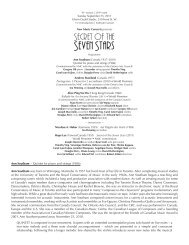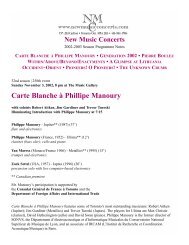2004-2005 Season The Hammerhead Consort - New Music Concerts
2004-2005 Season The Hammerhead Consort - New Music Concerts
2004-2005 Season The Hammerhead Consort - New Music Concerts
You also want an ePaper? Increase the reach of your titles
YUMPU automatically turns print PDFs into web optimized ePapers that Google loves.
NORMAN BETHUNE Biography<br />
Norman Bethune is unquestionably one of Canada’s true heroic figures, a brilliant surgeon and ambitious<br />
professional who was transformed by his belief in the fight against poverty and fascism into one of the great<br />
humanitarians of our century.<br />
Bethune was born in Gravenhurst, Ontario in 1890 and received his education there and in Toronto. He<br />
worked as both an ambulance driver and as a doctor in the First World War, followed by advanced medical<br />
studies in London, England. In the early 1920s he began a promising private practice in Detroit. Contracting<br />
tuberculosis, he became fascinated by the disease and, following his cure in a sanitarium, he eventually<br />
become a world leader in the field, inventing many new surgical instruments and procedures. Moving to<br />
Montreal, he was soon named head of Lung Surgery at Sacre Coeur Hospital in Montreal. His fight against<br />
tuberculosis began to involve him in more than just purely medical activities. Realising that the root cause of<br />
tuberculosis was poverty and poor medical treatment, he became increasingly vocal in his opposition to the<br />
established medical community. He was one of the first doctors in Canada to support the idea of a state-run,<br />
not-for-profit medical system.<br />
A complex personality, Bethune was a gifted amateur painter and writer, and helped found an art school for<br />
poor children in Montreal in the 1930s, which held classes in his apartment. His personal life was equally<br />
complex and passionate, as he married and divorced the same woman twice in a period of 8 years.<br />
In 1936 he went to Spain to fight fascism, creating a highly effective and efficient military medical service<br />
from scarce means. Based out of Madrid, he traveled throughout the country with the Servicio Canadense de<br />
Transfusion de Sangre, the blood transfusion service that he founded. In 1937 he returned to a hero’s welcome<br />
to Canada on a fundraising speaking tour that took him from coast to coast, raising thousands of dollars for the<br />
Republican cause in Spain. By now a committed communist, he decided that he would be of greater value<br />
working as a doctor as part of the Chinese Eighth Army, and he left for China in January 1938. Here he felt he<br />
could make a bigger difference than in Spain, working with a united Chinese front fighting fascism in the<br />
guise of Japanese Imperialism.<br />
During his 19-month stay in China, he transformed the Chinese medical system, creating a complete training<br />
system for Chinese doctors and nurses, and eventually creating small, portable operating rooms and<br />
transfusion services that were more adapted to the Chinese reality. His own feats as a surgeon were legendary,<br />
at times working 3 or 4 days without sleep, performing hundreds of operations in appalling conditions,<br />
refusing any salary from the Chinese military, and often giving away his meager rations to sick patients.<br />
He died in November 1939 as the result of septicaemia poisoning contracted from a patient during an<br />
operation. In 1952 the Chinese government created a permanent Norman Bethune memorial and museum, and<br />
Mao Tse-Tung’s essay In Memory of Norman Bethune was one of the most important texts to circulate in<br />
China in the 1960s. Several books have been published about his life and work including Ted Allen’s <strong>The</strong><br />
Scalpel, the Sword, Roderick Stewart’s Bethune and Larry Hannant’s recent Politics of Passion. <strong>The</strong> National<br />
Film Board produced a documentary on his life in 1964, and a resurgence of interest in his work began in<br />
Canada in the 1980s, leading to the production of the film Norman Bethune, starring Donald Sutherland.




